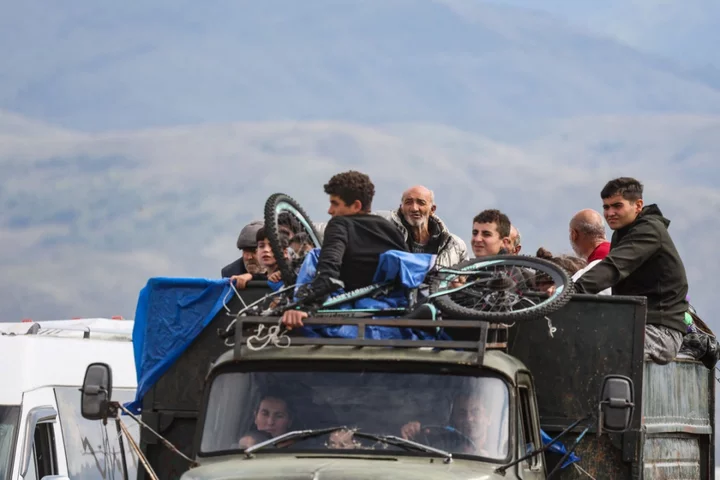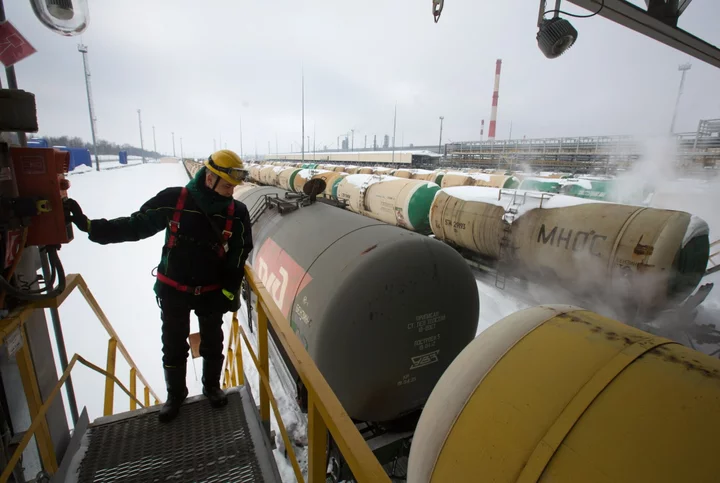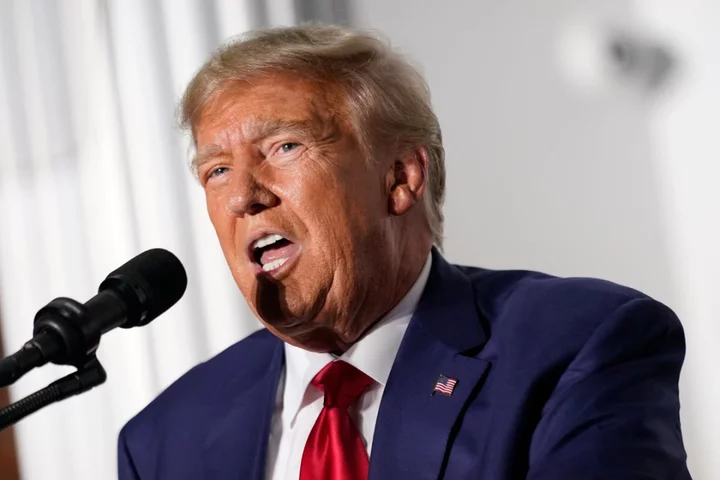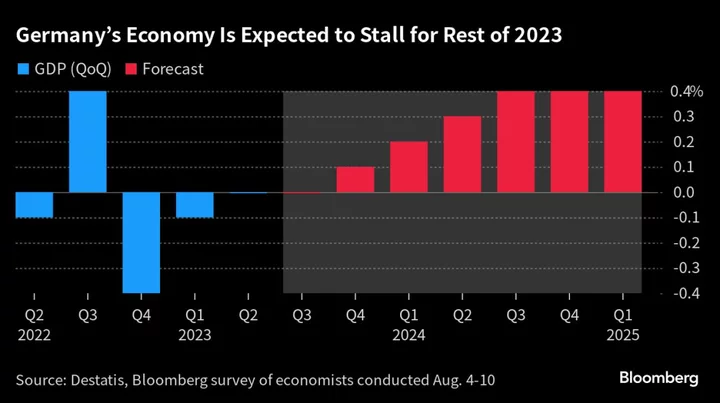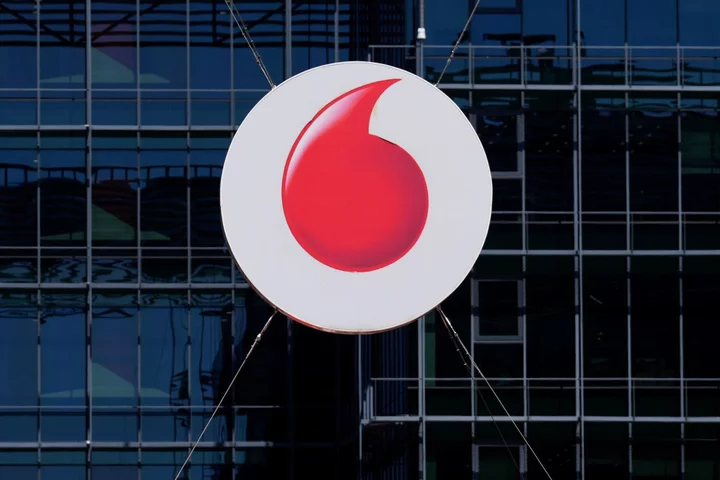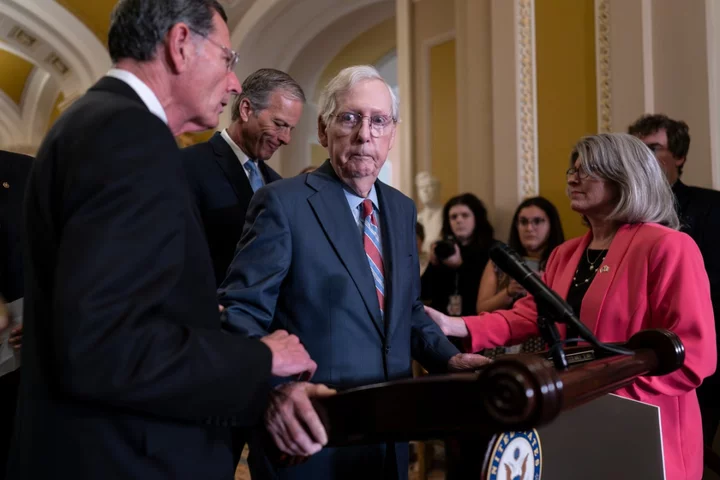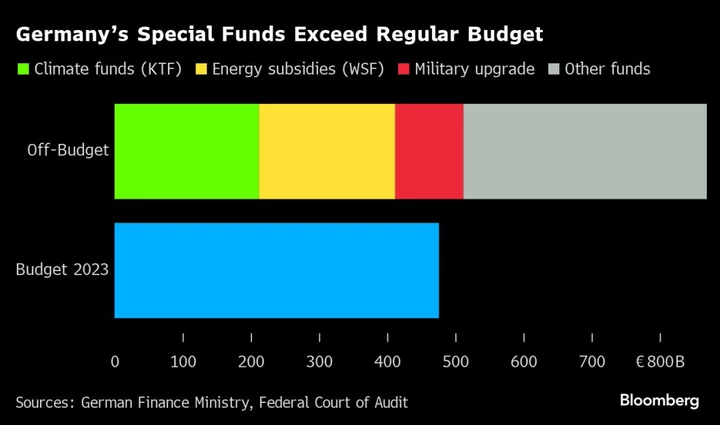Hungry and exhausted Armenian families jammed roads to flee Nagorno-Karabakh on Tuesday, as the United Nations and Washington called on Azerbaijan to protect civilians and let in aid. At least 20,000 of the 120,000 ethnic Armenians who live there have already crossed into Armenia after Azerbaijan launched a swift and successful military operation to defeat separatists who have governed the breakaway region for about 30 years. Hundreds of cars and buses crammed with refugees and their belongings snaked along mountain roads. Some fled packed into the back of open-topped trucks, others on tractors. Grandmother Narine Shakaryan arrived in her son-in-law's old car with six people packed inside. The 48-mile drive had taken 24 hours, she said. They had no food. “The whole way the children were crying, they were hungry,” Shakaryan told Reuters at the border, carrying her three-year-old granddaughter, who she said had become ill during the journey. “We left so we would stay alive.” Nearly 50 people, mostly children, scrambled from the back of one large truck. “It rained all night, there was no shelter. The nice driver took some of the children into his cabin to give at least some of them shelter,” said Maktar Talakyan, 54, who was travelling with her daughter Anna and her three grandchildren. Anna’s husband, a demobilised soldier who had fought for the now defeated separatist forces, remains in Karabakh, Talakyan said. As Armenians rushed to leave the Karabakh capital – known as Stepanakert by Armenia and Khankendi by Azerbaijan – fuel stations were overwhelmed by panic buying; at least 20 people were killed and 290 injured in a massive blaze when a fuel storage facility blew up. “I think we’re going to see the vast majority of people in Karabakh leaving for Armenia,” said Thomas de Waal, a senior fellow at the Carnegie Europe think tank. “They are being told to integrate into Azerbaijan, a country that they’ve never been part of, and most of them don’t even speak the language and are being told to dismantle their local institutions. That’s an offer that most people in Karabakh will not accept.” In the Armenian capital Yerevan, US Agency for International Development (USAID) chief Samantha Power called on Azerbaijan “to maintain the ceasefire and take concrete steps to protect the rights of civilians in Nagorno-Karabakh.” Power, who earlier handed Armenian prime minister Nikol Pashinyan a letter of support from president Joe Biden, said Azerbaijan’s use of force was unacceptable and that Washington was looking at an appropriate response. She called on Azerbaijan’s president Ilham Aliyev to live up to his promise to protect ethnic Armenian rights, fully reopen the Lachin corridor that connects the region to Armenia and let in aid deliveries and an international monitoring mission. Aliyev has pledged to guarantee the safety of Karabakh’s Armenians but said his iron fist had consigned the idea of the region’s independence to history. Asked if she believed Azeri forces had committed atrocities against civilians or combatants in Karabakh, she said: “We have heard very troubling reports of violence against civilians. At the same time given the chaos here and the trauma, the gathering of testimonies ... of the people who have come across is something that is just beginning.” United Nations high commissioner for human rights, Volker Turk, said in a statement late on Tuesday: “I am following with concern the evolving and fragile humanitarian situation. “It is important that the rights of the ethnic Armenian population on the ground are safeguarded and all actions rooted in international law. Protection of all civilians must be an absolute priority. Those affected must have access to humanitarian assistance.” The Azerbaijan victory changes the balance of power in the South Caucasus region, a patchwork of ethnicities crisscrossed with oil and gas pipelines where Russia, the United States, Turkey and Iran are jostling for influence. Since the breakup of the Soviet Union, Armenia has relied on a security partnership with Russia, while Azerbaijan grew close to Turkey, with which it shares linguistic and cultural ties. Armenia has lately sought closer ties with the West and blames Russia, which had peacekeepers in Karabakh but is now preoccupied with the war in Ukraine, for failing to protect Karabakh. Associated Press and Reuters contributed to this report. Felix Light reported for Reuters from the Armenian border village of Kornidzor. Read More What is Nakhchivan? And after Nagorno-Karabakh, is this the next crisis for Azerbaijan and Armenia Thousands of ethnic Armenians flee Nagorno-Karabakh after Azerbaijan seizes control in lightning offensive Exasperated residents flee Nagorno-Karabakh after Azerbaijan seizes control of breakaway region At least 20 dead and 300 injured in Nagorno-Karabakh fuel depot explosion At least 20 dead in gas station explosion as Nagorno-Karabakh residents flee to Armenia
Hungry and exhausted Armenian families jammed roads to flee Nagorno-Karabakh on Tuesday, as the United Nations and Washington called on Azerbaijan to protect civilians and let in aid.
At least 20,000 of the 120,000 ethnic Armenians who live there have already crossed into Armenia after Azerbaijan launched a swift and successful military operation to defeat separatists who have governed the breakaway region for about 30 years.
Hundreds of cars and buses crammed with refugees and their belongings snaked along mountain roads. Some fled packed into the back of open-topped trucks, others on tractors.
Grandmother Narine Shakaryan arrived in her son-in-law's old car with six people packed inside. The 48-mile drive had taken 24 hours, she said. They had no food.
“The whole way the children were crying, they were hungry,” Shakaryan told Reuters at the border, carrying her three-year-old granddaughter, who she said had become ill during the journey. “We left so we would stay alive.”
Nearly 50 people, mostly children, scrambled from the back of one large truck.
“It rained all night, there was no shelter. The nice driver took some of the children into his cabin to give at least some of them shelter,” said Maktar Talakyan, 54, who was travelling with her daughter Anna and her three grandchildren.
Anna’s husband, a demobilised soldier who had fought for the now defeated separatist forces, remains in Karabakh, Talakyan said.
As Armenians rushed to leave the Karabakh capital – known as Stepanakert by Armenia and Khankendi by Azerbaijan – fuel stations were overwhelmed by panic buying; at least 20 people were killed and 290 injured in a massive blaze when a fuel storage facility blew up.
“I think we’re going to see the vast majority of people in Karabakh leaving for Armenia,” said Thomas de Waal, a senior fellow at the Carnegie Europe think tank. “They are being told to integrate into Azerbaijan, a country that they’ve never been part of, and most of them don’t even speak the language and are being told to dismantle their local institutions. That’s an offer that most people in Karabakh will not accept.”
In the Armenian capital Yerevan, US Agency for International Development (USAID) chief Samantha Power called on Azerbaijan “to maintain the ceasefire and take concrete steps to protect the rights of civilians in Nagorno-Karabakh.”
Power, who earlier handed Armenian prime minister Nikol Pashinyan a letter of support from president Joe Biden, said Azerbaijan’s use of force was unacceptable and that Washington was looking at an appropriate response.
She called on Azerbaijan’s president Ilham Aliyev to live up to his promise to protect ethnic Armenian rights, fully reopen the Lachin corridor that connects the region to Armenia and let in aid deliveries and an international monitoring mission.
Aliyev has pledged to guarantee the safety of Karabakh’s Armenians but said his iron fist had consigned the idea of the region’s independence to history.
Asked if she believed Azeri forces had committed atrocities against civilians or combatants in Karabakh, she said: “We have heard very troubling reports of violence against civilians. At the same time given the chaos here and the trauma, the gathering of testimonies ... of the people who have come across is something that is just beginning.”
United Nations high commissioner for human rights, Volker Turk, said in a statement late on Tuesday: “I am following with concern the evolving and fragile humanitarian situation.
“It is important that the rights of the ethnic Armenian population on the ground are safeguarded and all actions rooted in international law. Protection of all civilians must be an absolute priority. Those affected must have access to humanitarian assistance.”
The Azerbaijan victory changes the balance of power in the South Caucasus region, a patchwork of ethnicities crisscrossed with oil and gas pipelines where Russia, the United States, Turkey and Iran are jostling for influence.
Since the breakup of the Soviet Union, Armenia has relied on a security partnership with Russia, while Azerbaijan grew close to Turkey, with which it shares linguistic and cultural ties.
Armenia has lately sought closer ties with the West and blames Russia, which had peacekeepers in Karabakh but is now preoccupied with the war in Ukraine, for failing to protect Karabakh.
Associated Press and Reuters contributed to this report. Felix Light reported for Reuters from the Armenian border village of Kornidzor.
Read More
What is Nakhchivan? And after Nagorno-Karabakh, is this the next crisis for Azerbaijan and Armenia
Thousands of ethnic Armenians flee Nagorno-Karabakh after Azerbaijan seizes control in lightning offensive
Exasperated residents flee Nagorno-Karabakh after Azerbaijan seizes control of breakaway region
At least 20 dead and 300 injured in Nagorno-Karabakh fuel depot explosion
At least 20 dead in gas station explosion as Nagorno-Karabakh residents flee to Armenia

